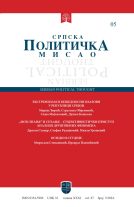- Home page
- Researchers
- Dragan Živaljević
Dragan Živaljević
Academy for national security, Belgrade

POLITICAL AND SOCIAL ASPECTS OF CONTEMPORARY MIGRATION
At the beginning of the work, the basic determinants of the migration phenomenon are given, and then the complex and far-reaching implications of contemporary migratory movements from the Middle East and North Africa to the European continent are pointed out with emphasis on the European continent. In the continuation of the work, political, social and security aspects of this phenomenon are being analyzed and scientifically elaborated. Special attention is paid to the role of political subjects and current policymakers in the further stigmatisation of the migrant population and developing xenophobic patterns of behaviour in the countries of reception. The work gives an account of social changes that societies face along the way of migratory movements. The problems in the integration of the migrant population that are conditioned by different social stereotypes, real social circumstances or personal limitations of migrants are pointed out. The connection between the perception of socio-cultured differences between migrants and the domicile population of the receiving countries and the socio-political orientation of these societies personified in their attitude towards migrants is additionally being considered. The work concludes that the lack of a coherent European migrant policy and extensive research of this phenomenon, together with the complex etiological background of the phenomenon and its strong multispheric impact, will have lasting negative consequences for both European societies and the migrant population. In the absence of reliable statistical parameters, half-truths or stereotypes mostly determine the perception of this phenomenon in the public. The lack of reliable information also tends to strengthen the image in society that current migrations are beyond the control of state bodies, which undermines the integrity of the institutions of the system and strengthens internal political and social crises. In the final part of the paper, the solutions that can be used by the relevant state structures and institutions of the European Union are proposed in order to prevent negative implications of migratory movements and prevent further humanitarian disasters, to which this population is exposed.
